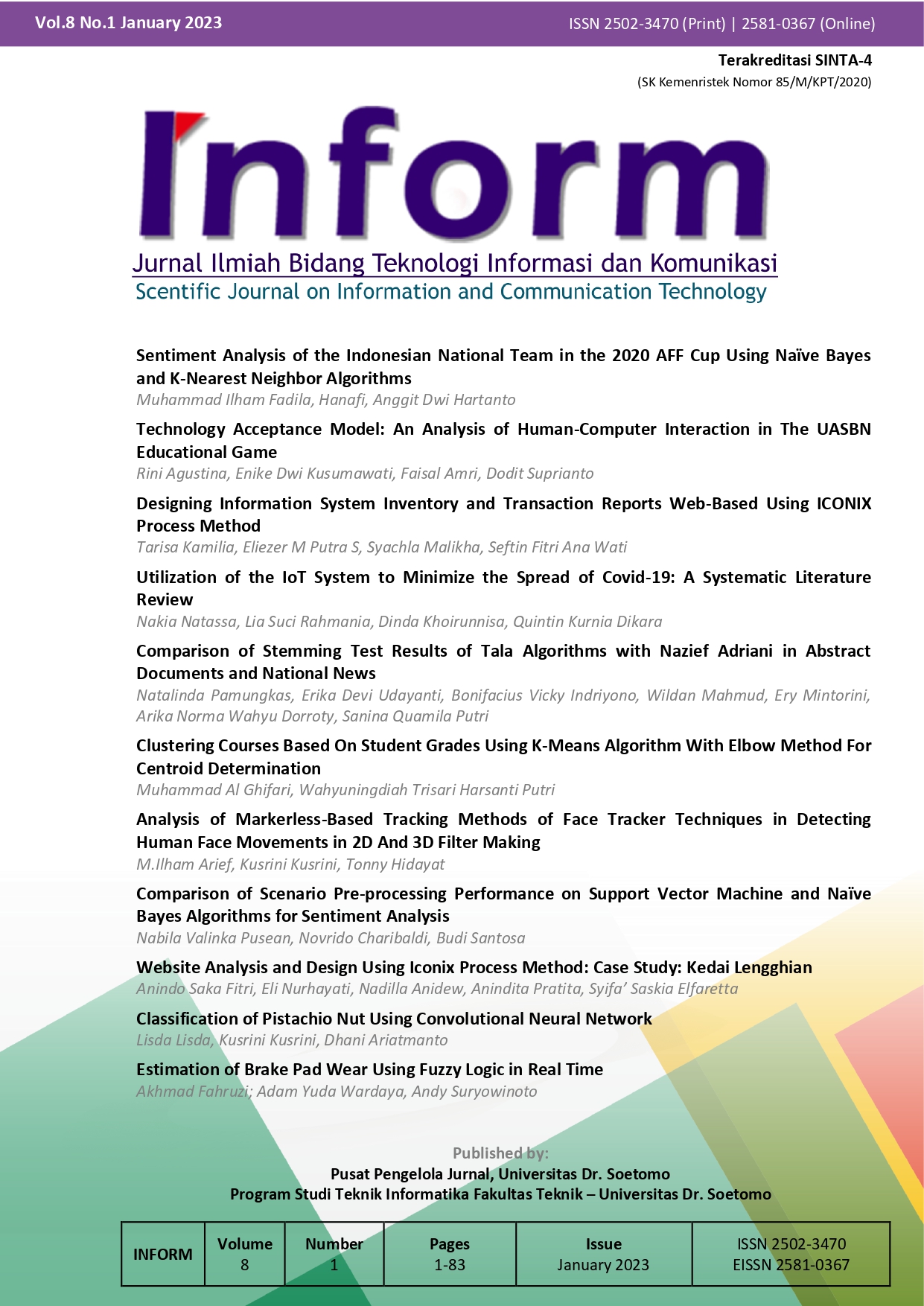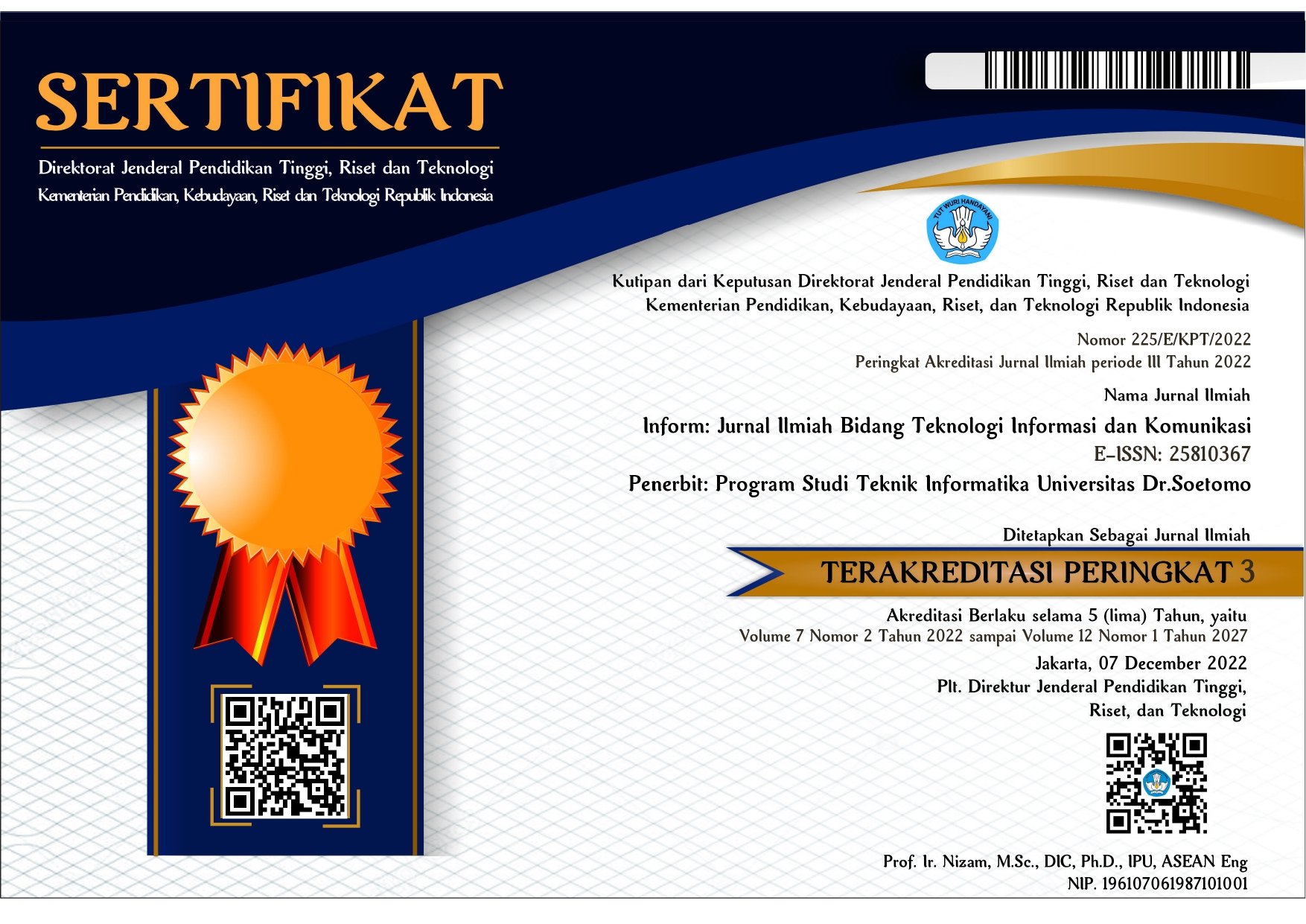Sentiment Analysis of the Indonesian National Team in the 2020 AFF Cup Using Naïve Bayes and K-Nearest Neighbor Algorithms
 Abstract views: 497
,
Abstract views: 497
,
 PDF downloads: 590
PDF downloads: 590
Abstract
The AFF Cup is a football competition organized by the ASEAN Football Federation, or AFF for short. The 2020 AFF Cup was held in 2021 due to the COVID-19 pandemic. The Indonesian National Team advanced to the final round and became runner-up in the championship. With the end of the championship and the Indonesian National Team having to accept defeat in the final, the public responded through tweets on Twitter. Through these tweets, it will be known how the public evaluates the performance of the Indonesian National Team in the 2020 AFF Cup. It is vital to carry out this research to obtain information regarding society's response. The research that will be conducted is sentiment analysis. Sentiment analysis will be carried out on Rapid Miner software, with the algorithms used being Naïve Bayes and K-Nearest Neighbor. The data used to perform sentiment analysis are tweets from Twitter taken using SNScrape. This research aims to analyze public responses to the Indonesian National Team in the 2020 AFF Cup. This research will determine the percentage of positive, neutral, and negative sentiments from public responses. So that later it can be concluded how the public responds to the Indonesian National Team, whether positive, neutral, or negative. It is also to find out which algorithm has the higher accuracy. The results obtained for Naive Bayes with an accuracy of 64.74% are 71.54% positive sentiment, 15.45% neutral sentiment, and 13.01% negative sentiment. For K-Nearest Neighbor, with an accuracy of 65.64% is 80.49% positive sentiment, 15.45% neutral sentiment, and 4.06% negative sentiment. Both algorithms have the highest accuracy compared to other algorithms in Rapid Miner when the sentiment analysis is performed, with K-Nearest Neighbor having slightly higher accuracy. Most tweets about the Indonesian National Team in the 2020 AFF Cup had positive sentiments. Based on these results, it can be concluded that even though the Indonesian National Team did not win the 2020 AFF Cup, the public still responded positively.
References
A. B. Rogers, Soccer: Science on the Pitch. Greenhaven Publishing LLC, 2017.
T. Dunmore and S. Murray, Soccer For Dummies. Wiley, 2022.
J. Luxbacher, Soccer: Steps to Success. Human Kinetics, 2013.
T. Strudwick, Soccer Science. Human Kinetics, 2016.
I. Youssef Abdelhamid, H. Yahaya, N. Z. Ahmad, and M. Z. Mohammad Nazmi, “Foreign Language Learning Through Social Media: A Review Study,” Int. J. Acad. Res. Bus. Soc. Sci., vol. 12, no. 6, 2022, doi: 10.6007/ijarbss/v12-i6/13910.
H. R. Alhakiem and E. B. Setiawan, “Aspect-Bas1ed Sentiment Analysis on Twitter Using Logistic Regression with FastText Feature Expansion,” J. RESTI (Rekayasa Sist. dan Teknol. Informasi), vol. 6, no. 5, pp. 840–846, 2022, doi: 10.29207/resti.v6i5.4429.
N. Gulnazir and K. Salehuddin, “Investigating Lexical Variation and Change in Malaysian Twitter: A Conceptual Paper,” GEMA Online J. Lang. Stud., vol. 22, no. 4, pp. 90–107, 2022, doi: 10.17576/gema-2022-2204-06.
L. Fitton, A. Hussain, and B. Leaning, Twitter For Dummies. Wiley, 2014.
D. Murthy, Twitter. Polity Press, 2018.
G. Kent, You Are What You Tweet: Harness the Power of Twitter to Create a Happier, Healthier Life. Star Stone Press, 2015.
AFF, “AFF Cup - About the Tournament,” AFF. https://www.affmitsubishielectriccup.com/2022/about/about-the-tournament (accessed Dec. 10, 2022).
A. E. Pratama, A. Ariesta, and G. Gata, “Analisis Sentimen Masyarakat terhadap Tim Nasional Indonesia pada Piala AFF 2020 Menggunakan Algoritma K-Nearest Neighbors,” J. TICOM Technol. Inf. Commun., vol. 10, no. 3, pp. 187–196, 2022.
B. Liu, Sentiment Analysis: Mining Opinions, Sentiments, and Emotions. Cambridge University Press, 2020.
I. B. A. Peling, I. N. Arnawan, I. P. A. Arthawan, and I. G. N. Janardana, “Implementation of Data Mining To Predict Period of Students Study Using Naive Bayes Algorithm,” Int. J. Eng. Emerg. Technol., vol. 2, no. 1, p. 53, 2017, doi: 10.24843/ijeet.2017.v02.i01.p11.
K. Chomboon, P. Chujai, P. Teerarassammee, K. Kerdprasop, and N. Kerdprasop, “An Empirical Study of Distance Metrics for k-Nearest Neighbor Algorithm,” pp. 280–285, 2015, doi: 10.12792/iciae2015.051.
M. Arnaldo, “Rapidminer | What is Rapidminer | Rapidminer for Beginners,” Analytics Vidhya, Oct. 04, 2021. https://www.analyticsvidhya.com/blog/2021/10/intro-to-rapidminer-a-no-code-development-platform-for-data-mining-with-case-study/ (accessed Dec. 28, 2022).
JustAnotherArchivist, “snscrape: A social networking service scraper,” 2022. https://github.com/JustAnotherArchivist/snscrape (accessed Dec. 28, 2022).
F. Isik, G. Ozden, and M. Kuntalp, “Importance of data preprocessing for neural networks modeling: The case of estimating the compaction parameters of soils,” Energy Educ. Sci. Technol. Part A Energy Sci. Res., vol. 29, no. 2, pp. 871–882, 2012.
A. Aloysius and P. Nikil, “Data Preprocessing in Sentiment Analysis Using Twitter Data,” Int. Educ. Appl. Res. J., vol. 03, no. July, pp. 89–92, 2019.
K. Welbers, W. Van Atteveldt, and K. Benoit, “Text Analysis in R,” Commun. Methods Meas., vol. 11, no. 4, pp. 245–265, 2017, doi: 10.1080/19312458.2017.1387238.
R. Novendri, A. S. Callista, D. N. Pratama, and C. E. Puspita, “Sentiment Analysis of YouTube Movie Trailer Comments Using Naïve Bayes,” Bull. Comput. Sci. Electr. Eng., vol. 1, no. 1, pp. 26–32, 2020, doi: 10.25008/bcsee.v1i1.5.
P. Daowadung and Y. H. Chen, “Stop word in readability assessment of Thai text,” Proc. 12th IEEE Int. Conf. Adv. Learn. Technol. ICALT 2012, pp. 497–499, 2012, doi: 10.1109/ICALT.2012.9.
V. D. Antonio, “Analisis Kinerja Ekstrasi Fitur TF-IDF (Term Frequency – Inverse Document Frequency) Untuk Algoritma Klasifikasi Stochastic Gradient Descent Pada Analisis Sentimen Teks Indonesia,” Tesis, pp. 1–82, 2021.
A. M. Pravina, I. Cholissodin, and P. P. Adikara, “Analisis Sentimen Tentang Opini Maskapai Penerbangan pada Dokumen Twitter Menggunakan Algoritme Support Vector Machine (SVM),” J. Pengemb. Teknol. Inf. dan Ilmu Komput., vol. 3, no. 3, pp. 2789–2797, 2019, [Online]. Available: http://j-ptiik.ub.ac.id
N. Yahya and A. Jananto, “Komparasi Kinerja Algoritma C.45 Dan Naive Bayes Untuk Prediksi Kegiatan Penerimaanmahasiswa Baru (Studi Kasus : Universitas Stikubank Semarang),” Pros. SENDI, no. 2014, pp. 978–979, 2019, [Online]. Available: https://www.unisbank.ac.id/ojs/index.php/sendi_u/article/view/7389/2369
Copyright (c) 2023 Muhammad Ilham Fadila, Hanafi, Anggit Dwi Hartanto

This work is licensed under a Creative Commons Attribution-ShareAlike 4.0 International License.
Authors who publish with Inform: Jurnal Ilmiah Bidang Teknologi Informasi dan Komunikasi agree to the following terms:
-
Authors retain copyright and grant the journal right of first publication with the work simultaneously licensed under a Creative Commons Attribution License (CC BY-SA 4.0) that allows others to share the work with an acknowledgment of the work's authorship and initial publication in this journal.
-
Authors are able to enter into separate, additional contractual arrangements for the non-exclusive distribution of the journal's published version of the work (e.g., post it to an institutional repository or publish it in a book), with an acknowledgment of its initial publication in this journal.
-
Authors are permitted and encouraged to post their work online (e.g., in institutional repositories or on their website) prior to and during the submission process, as it can lead to productive exchanges, as well as earlier and greater citation of published work.











